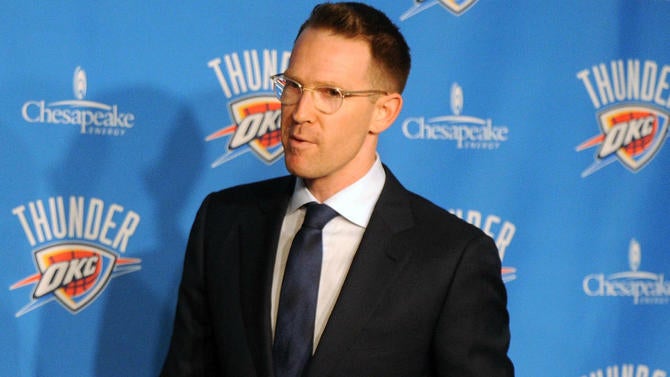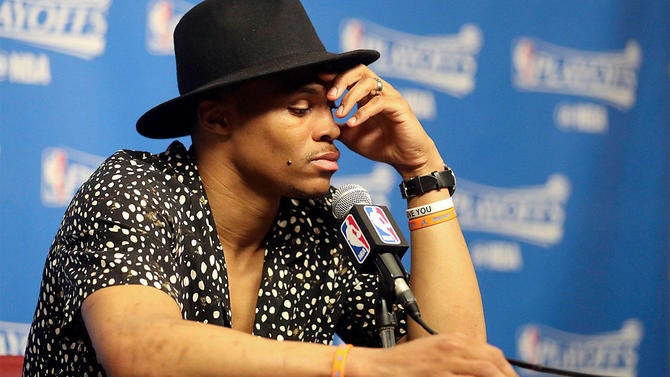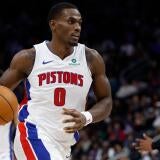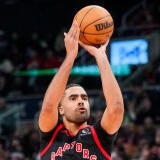
Future of OKC Thunder, Russell Westbrook will be shaped by key offseason decisions
Trade Kanter? Re-sign Roberson? What about Westbrook?

This team, honestly, was never supposed to exist.
The 2016-17 Thunder were a lab accident, and not a happy one. They were the product of what happens when you build supporting structures around a great spire, only to find that spire has lifted off the ground like a space shuttle and blasted off to light years away. Oklahoma City's season ended Tuesday night following a 105-99 loss in Game 5 to the Rockets. It began a summer that will be the most challenging of GM Sam Presti's career, and for the first time, carries with it decisions that cannot be easily justified or undone with the comfort of their two superstars.
When Kevin Durant bolted for the Warriors last summer, the Thunder were of course in shock. They knew it was possible, but it's not something you can plan for. Durant leaving went against everything he'd ever said to them, and they'd done everything they at least felt was in their power to keep him. You can tear apart their prior decisions to your heart's content, but it's not like OKC was careless and sloppy with the Durant era; the team made three Western Conference Finals and the other years involved injuries to either Westbrook or Durant.
So when he left, well ... there wasn't really room or time for a Plan B. That Serge Ibaka trade? It had been made with the idea Durant would be there. Ibaka had clashed with teammates over the years, no more or less than your average player does, and in return for him, they were able to snag a youngster they loved the upside of in Domantas Sabonis along with Victor Oladipo, who could have given them the bench sixth man they've needed to make sure the team didn't fall to pieces if Durant and Westbrook sat.
Then Durant left. As relayed in SI.com's profile of Presti, all the free agents that could have helped the Thunder were gone. They had to piece it together on the fly.
In the wake of OKC's defeat, there will be condemnations of the team, its status, where it's at, how it functions. Absolutes will be drawn from a fluid scenario. The Thunder did not win a title so the front office is a failure, which is just crazy.
They put a Western Conference finals team around Kevin Durant and he bolted. That's his right, but you have to then consider where Oklahoma City is at in its team development.
This season was Year Zero. If you're doing a rebuild, that's the year that you liquidate your stars for picks and focus on acquiring young talent. If you're doing a reload/reconfiguration as the Thunder were, you're just trying to get a sense of where you are. You're just trying to find your bearings. It's like trying to calibrate a highly sensitive machine by sight and sound. As quoted here, Presti described this season as a "season of discovery." They discovered a lot. Oladipo can be good, but struggled to be great. Steven Adams had a down year and was still pretty good. Sabonis is going to be good ... eventually. Abrines will be helpful ... eventually. Jerami Grant dunked a few times.
But this roster was brutally young, constructed to support two superstars. When the Thunder lost to the Spurs in 2014, the criticism was that they were too old, with players like Derek Fisher and Caron Butler taking up space on the roster. Now they went young, which they needed to do. They developed a pipeline. But the supporting structure for those players half-collapsed when Durant left. The remainder was Westbrook, who had to carry them. You can argue with Westbrook's approach in doing so, but that was the structure.

So now the Thunder have to actually build a team, and it's going to be fascinating. Here are the big decisions and moves the Thunder have to make this summer to move forward.
TAJ GIBSON free agency
The Thunder traded Cameron Payne, Anthony Morrow and Joffrey Lauvergne (or basically, nothing) for Gibson, Doug McDermott and a second-rounder at the trade deadline. Gibson is a free agent this summer and could demand a salary well north of $15 million per season. OKC only has $11 million in cap space this summer. They can go over that to sign Gibson, but they only have $32 million before the luxury tax.
It is at this point that we reach the unavoidable divide. Some will say that owner Clay Bennett, having moved the team from Seattle a full decade ago, needs to just pay the tax to win. This is retributive and ignores market realities. Plus, there is no reasonable scenario where it makes sense to pay luxury tax on a team that won't contend for a title. It's like paying premium dollars for a sedan. The sedan is nice! It gets you where you want to go. But it's not a sports car.
Keeping Gibson should be a priority. He fits their culture with a no-complaints, high effort approach, he can hit the mid-range jumper and short hooks, and is a great defender. But keeping him will likely mean other moves.
The Kanter problem
Man, did the Blazers screw OKC. When they offered Kanter a max contract two years ago, OKC, cap-strapped and needing to put those supporting pieces around Durant and Westbrook, matched. Kanter was very good in 2016, and helped them get past the Spurs in the second-round of the playoffs last season. But without Durant spacing the floor and drawing defensive attention, he's just your average bench big, taking up space, struggling to defend the pick-and-roll in glaring ways, and taking up $17.8 million in cap space next year.
Here's the killer: With Durant, Kanter was worth keeping at that price. Without Durant, not only is he not worth keeping at that price, but his defensive shortcomings are more pronounced (he was unplayable against Houston) and that lowers his trade value. This is only real wild card Presti has with the roster unless he wants to get crazy and deal Adams. If he can find a team that needs Kanter so badly they'll deal for him, they can shave some money off while getting a few more assets. Kanter is not a bad player; there are games and situations where he's dominant. But he is a bad fit for what the Thunder need, at that salary.
The wing issue
OKC needs a small forward upgrade. You know, someone who can score and defend, who's athletic and a good floor-spacer. Someone like Durant. But of course there are no other Durants out there. The small forward class is wretched this year. HoopsHype has Jeff Green as the ninth best available. Rudy Gay was second on our list before his Achilles injury, Andre Iguodala is fourth.
Sure, Alex Abrines will improve. Jerami Grant can fill out the bench, but it should also be noted the Thunder were outscored by 28.7 points per 100 possessions with Grant on the floor against the Rockets, second-worst behind only Kanter among the rotation players.
A trade would help, or they can try and sign Danilo Gallinari, but their options are truly limited. This is OKC's biggest glaring weakness and it's a tough one to solve, again, because Durant left.
The Roberson conundrum
Andre Roberson shot 52 percent from the field and 41 percent from 3-point range in the first-round series against the Rockets. He did the one thing everyone said he was a liability at, and yet he still wound up hurting the team by shooting 14 percent at the free-throw line, as Houston went to Hack-An-Dre. Roberson shot poorly this season, but played first-team All-Defense on that end of the floor. He's athletic and smart, a hard worker and tough. He's also a restricted free agent. If a team comes through with a big offer, the Thunder are going to be in a pickle. They need more shooting. They can't afford to lose him.
It's a bind. How they manage this situation will be tricky. Basically, if they bring back Roberson and Gibson, without trading anyone, they can only get better through internal development. That's a risky gamble for a team that needs to get better now. Why do they need to get better now?
The Westbrook issue
From ESPN:
There is one more question, and it's quietly their biggest of the offseason. With the new collective bargaining agreement in place, Westbrook will be eligible for another extension as the team's designated player.
After signing an extension last summer in the wake of Durant's departure, Westbrook can sign another in the ballpark of $220 million over five years this summer. Westbrook is signed through the 2017-18 season, with a player option on the following year, but the Thunder would obviously like to have a longer commitment from their franchise player.
The expectation is that they will make the offer, but should Westbrook decline, all that talk of stabilizing the franchise would get a little more wobbly, and with only a year guaranteed, talk of trading him could spark again. It will certainly be alarming for the front office, especially after what it went through with Durant.
(Via NBA - Roller-coaster ride ends for Oklahoma City Thunder, but the work might be just beginning.)

For all the talk of Westbrook's extension he signed last year, committing to OKC after Durant left ... he could be gone a year from now. He left himself outs. That's smart. You don't want to get strapped to a sinking ship in your prime. But it complicates things for OKC. If he doesn't sign that extension, how do you convince another star to come play with him?
Can you really risk going into free agency like you did with Durant, not knowing if he'll come back?
The big picture
OKC was a good team this year. They won 45-plus games, made the sixth-seed, got an MVP-level season from Westbrook, showed some flashes, won a lot of games they should have lost. But their cap sheet is nearly full, and only gets tighter in subsequent years. (Steven Adams' extension kicks in next year, so in subsequent seasons they're actually on pace to be over the cap.) So if OKC wants to pivot around Westbrook, adding more shooters/playmakers, they're going to need to pull off some big deals. Presti has quietly been one of the shrewdest trading execs in the league, with the Harden deal being the exception. He can pull this off. He knows the value of of how to leverage assets, and the importance of sustainability. The young players will improve.
But as difficult as this season was for the Thunder, this summer may be even tougher.

















